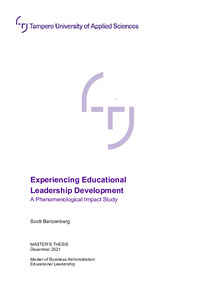Perceptions of Educational Leadership in India - Exploring the Dynamics of Educational Leadership
Dholkawala, Sufiyan (2023)
Dholkawala, Sufiyan
2023
All rights reserved. This publication is copyrighted. You may download, display and print it for Your own personal use. Commercial use is prohibited.
Julkaisun pysyvä osoite on
https://urn.fi/URN:NBN:fi:amk-2023121135975
https://urn.fi/URN:NBN:fi:amk-2023121135975
Tiivistelmä
The research was conducted to explore perceptions of educational leadership within schools managed by the Mujaddid Alfesani Education Trust in India. The aim is to shed light on what are the perceptions of educational leaders in India regarding effective leadership practices and their impact on student outcomes.
The objectives were to understand the diverse perceptions of key stakeholders, examine how cultural and institutional factors shape these perspectives, and assess the impact on educational leadership practices within the schools of India. Qualitative methodology was employed involving semi-structured interviews with principals, teachers, and former staff across various roles. Purposeful sampling facilitated representation across leadership tiers. Interviews via Zoom enabled geographic diversity while thematic analysis systematically extracted insights.
Findings revealed the predominance of transformational leadership styles focused on empowerment and collaboration. Effective communication and transparency were pivotal in building trust and alignment. The necessity for ethical, adaptive leadership responding to shifting educational paradigms was underscored. The study showed a positive impact on student outcomes of diverse educational leadership styles of the prominent stakeholders. The research highlighted multifaceted perceptions shaped by cultural nuances within the trust's context. It emphasized leadership practices embracing innovation and diversity while addressing the evolving needs of Indian education. Insights can inform policies and training programs for educational leaders.
The objectives were to understand the diverse perceptions of key stakeholders, examine how cultural and institutional factors shape these perspectives, and assess the impact on educational leadership practices within the schools of India. Qualitative methodology was employed involving semi-structured interviews with principals, teachers, and former staff across various roles. Purposeful sampling facilitated representation across leadership tiers. Interviews via Zoom enabled geographic diversity while thematic analysis systematically extracted insights.
Findings revealed the predominance of transformational leadership styles focused on empowerment and collaboration. Effective communication and transparency were pivotal in building trust and alignment. The necessity for ethical, adaptive leadership responding to shifting educational paradigms was underscored. The study showed a positive impact on student outcomes of diverse educational leadership styles of the prominent stakeholders. The research highlighted multifaceted perceptions shaped by cultural nuances within the trust's context. It emphasized leadership practices embracing innovation and diversity while addressing the evolving needs of Indian education. Insights can inform policies and training programs for educational leaders.
Kokoelmat
Samankaltainen aineisto
Näytetään aineisto, joilla on samankaltaisia nimekkeitä, tekijöitä tai asiasanoja.
-
Women and Leadership: A Study about Women and their perception of effective leadership and leadership qualities
Hawela, Rosa (2019)The thesis is a qualitative study of women and leadership. Particularly women's views on good and effective leadership and women's leadership qualities. The study addresses two research questions. The research questions ... -
“You have to act as a labour union for the employees” : A qualitative study into preferred style of leadership and job satisfaction in Finland and Estonia
Kekäläinen, Hanna (2019)This qualitative study, conducted as semi-structured interviews, studies the preferred style of leadership and its implications to employee job satisfaction. The study addresses three main research questions. The first one ... -
Experiencing educational leadership development : a phenomenological impact study
Benzenberg, Scott Allen (2021)The purpose of this study was to conduct an impact evaluation of the Master’s in Educational Leadership (MEL) program at Tampere University of Applied Sciences to understand whether the program had impacted the leadership ...



